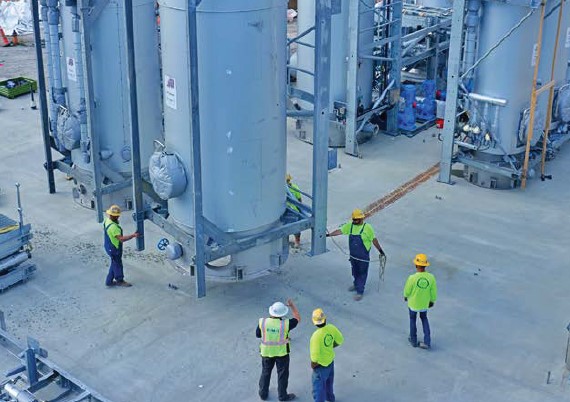Case Study
Kansas City wanted a thermal hydrolysis plant for their city, but needed to make sure the project did not emit noxious odors, and that the final products were safe to use.
Exceeding expectations, OTC's solution turns biosolids into natural gas and fertilizer for landscaping, agriculture, and the production of new green spaces.
Our Challenge
Thermal hydrolysis is a fascinating and innovative technology. This process transforms biological waste into usable biomass and gas that can feed directly into natural gas pipelines. More popular in Europe, there are currently fewer than 10 plants installed in the United States. When Kansas City, Missouri, began construction on its plant, OTC Industrial Technologies was there to help.
Designing and constructing a thermal hydrolysis plant comes with a variety of challenges. While the plant is able to convert waste materials into amazing resources, the process isn't easy. Kansas City wanted a thermal hydrolysis plant for their city, but needed to make sure the project did not emit noxious odors, and that the final products were safe to use. Additionally, after construction was finished, the city needed a team that could provide comprehensive and rapid maintenance when needed.
The city and project team called on OTC Technologies for help with this innovative and high-profile project.

Our Solution
With these challenges in mind, the city began construction. After the demolition of the previous facility that burned biosolids, construction began on the new thermal hydrolysis plant. A $140 million project, the new plant uses breakthrough technology to turn wastewater into natural gas and fertilizer.
Due to the complexity of the processes in the facility, the proximity to urban and residential areas, and the noxious nature of the product, maintenance and management of the facility are critical to success. To manage these processes and ensure continuous operation, Kansas City turned to the experts at OTC to handle essential maintenance services for the plant. These services include (but aren't limited to):
- Monitoring the tanks to prevent odors from emitting.
- Ensuring that the natural gas pipeline is safe and in working order.
- Smooth operation of the pumps and pumping systems.
The new facility's products will be used for landscaping, agriculture, and production of new green spaces. Additionally, the facility feeds natural gas directly into the city, a process which generates revenue from the gas company.
As the ninth facility of its kind in North America, the city was able to turn waste into a source of revenue and renewable energy.
Results
As only the ninth facility of its kind in the country Kansas City's thermal hydrolysis plant will be a valuable asset to the city. By removing the previous facility that was inefficient and polluting, the city was able to turn waste into a source of revenue and renewable energy.
